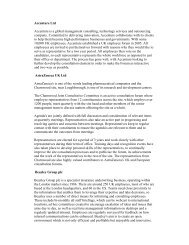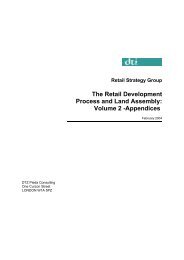Public Policy: Using Market-Based Approaches - Department for ...
Public Policy: Using Market-Based Approaches - Department for ...
Public Policy: Using Market-Based Approaches - Department for ...
You also want an ePaper? Increase the reach of your titles
YUMPU automatically turns print PDFs into web optimized ePapers that Google loves.
SECTION 12<br />
Issues in the<br />
implementation of<br />
market mechanisms<br />
This section provides additional details from the economic literature reviewed in<br />
Part III on the main issues involved in the implementation of market<br />
mechanisms. Properly applied, market mechanisms can lead to a more efficient<br />
and often more user-friendly system than under a traditional public policy<br />
system. However, implementing these mechanisms is rarely straight<strong>for</strong>ward and<br />
runs the risk of introducing market failures as well as market benefits into the<br />
public sector. In this section we discuss issues that can arise in implementing<br />
each of the market mechanisms, focusing on the potential problems highlighted<br />
by theory. We also suggest ways in which these issues can be addressed and<br />
review the available evidence on the overall per<strong>for</strong>mance of each mechanism.<br />
Competitive tendering of service provision<br />
MARKET POWER<br />
The benefits from a competitive tendering process can only be realised if there<br />
is genuine competition <strong>for</strong> the contract. However, if the process does not elicit<br />
genuine competition, either due to market power by a single firm, or due to<br />
collusion amongst potential bidders, then an optimal result is unlikely to be<br />
obtained. As a result, prices may be higher and quality may be lower than under<br />
government provision. Unless there are other benefits such as improvements in<br />
consumer choice, it is possible that consumer welfare may be reduced under the<br />
market mechanism compared with government provision.<br />
Single firm market power<br />
When conducting a competitive tendering process it is important to ensure that<br />
there will be competing bidders. This outcome is highly unlikely where only one<br />
firm is in a strong position to win the contract. This situation can arise <strong>for</strong> a<br />
number of reasons – there may be only one firm which is genuinely able to fulfil<br />
the requirements, the contract may be structured in such a way that only one<br />
firm is in a credible position to bid, or there may be strong incumbency<br />
advantages.<br />
If there is only one firm that is able to provide the required service, then it is<br />
debatable whether a competitive tendering process is appropriate. However, in<br />
some cases, this problem may be solved through appropriate structuring of the<br />
170
















